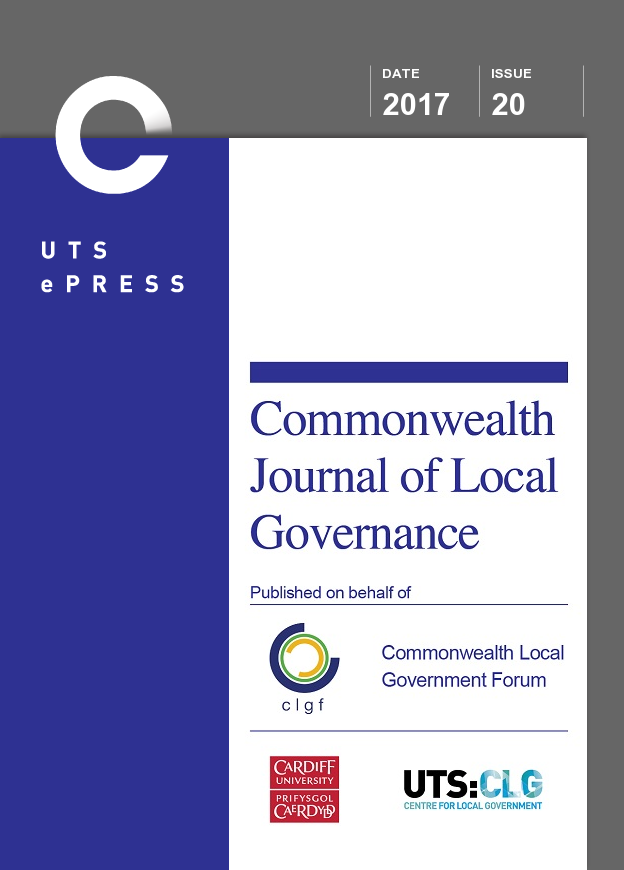Botswana development vision and localisation of UN Sustainable Development Goals
Main Article Content
Abstract
This paper considers how the Botswana government could use the experiences of implementing the UN Millennium Development Goals (MDGs) to localise their successor Sustainable Development Goals (SDGs) in the country’s new development strategy Vision 2036. Despite the recentralisation of some elements of service delivery (water, education, and health) reversing the decentralisation trend, Botswana attained respectable successes in achieving MDG targets. The localisation of development goals must however go beyond simply establishing effective and efficient decentralised local government units, to implementing local economic development strategies that enable communities to take an active role in national development processes. The primary question that this discussion paper seeks to answer is: can Botswana utilise lessons learnt in implementing the MDGs to the SDGs, to foster an empowered local community? The paper highlights how community empowerment is particularly critical in Botswana; on the one hand given the current over-dependence of the economy on a limited number of extractive, finite mineral resources, and on the other because of the multi-dimensional character of poverty and high income inequality afflicting Botswanans. The call for greater decentralisation in Botswana’s Vision 2036 provides a good example for the Commonwealth as it goes beyond the SDGs’ target date of 2030.
Keywords
Botswana; Millennium Development Goals; Sustainable Development Goals; Vision 2036.
Article Details
Issue
Section
Authors who submit articles to this journal from 31st March 2014 for publication, agree to the following terms:
a) Authors retain copyright and grant the journal right of first publication with the work simultaneously licensed under a Creative Commons Attribution License that allows others to share and adapt the work with an acknowledgement of the work's authorship and initial publication in this journal.
b) Authors are able to enter into separate, additional contractual arrangements for the non-exclusive distribution of the journal's published version of the work (e.g., post it to an institutional repository or publish it in a book), with an acknowledgement of its initial publication in this journal.
c) Authors are permitted and encouraged to post their work online (e.g., in institutional repositories or on their website) prior to and during the submission process, as it can lead to productive exchanges, as well as earlier and greater citation of published work (See The Open Access Citation Advantage Service). Where authors include such a work in an institutional repository or on their website (ie. a copy of a work which has been published in a UTS ePRESS journal, or a pre-print or post-print version of that work), we request that they include a statement that acknowledges the UTS ePRESS publication including the name of the journal, the volume number and a web-link to the journal item.
d) Authors should be aware that the Creative Commons Attribution (CC-BY) License permits readers to share (copy and redistribute the work in any medium or format) and adapt (remix, transform, and build upon the work) for any purpose, even commercially, provided they also give appropriate credit to the work, provide a link to the license, and indicate if changes were made. They may do these things in any reasonable manner, but not in any way that suggests you or your publisher endorses their use.
For Issue 13/14, and all issues before, the following copyright applied:
Authors submitting a paper to UTS ePRESS publications agree to assign a limited license to UTS ePRESS if and when the manuscript is accepted for publication. This license allows UTS ePRESS to publish a manuscript in a given issue. Articles published by UTS ePRESS are protected by copyright which is retained by the authors who assert their moral rights. Authors control translation and reproduction rights to their works published by UTS ePRESS. UTS ePRESS publications are copyright and all rights are reserved worldwide. Downloads of specific portions of them are permitted for personal use only, not for commercial use or resale. Permissions to reprint or use any materials should be directed to UTS ePRESS via the journal's main editor, Alison Brown, journal@clgf.org.uk
